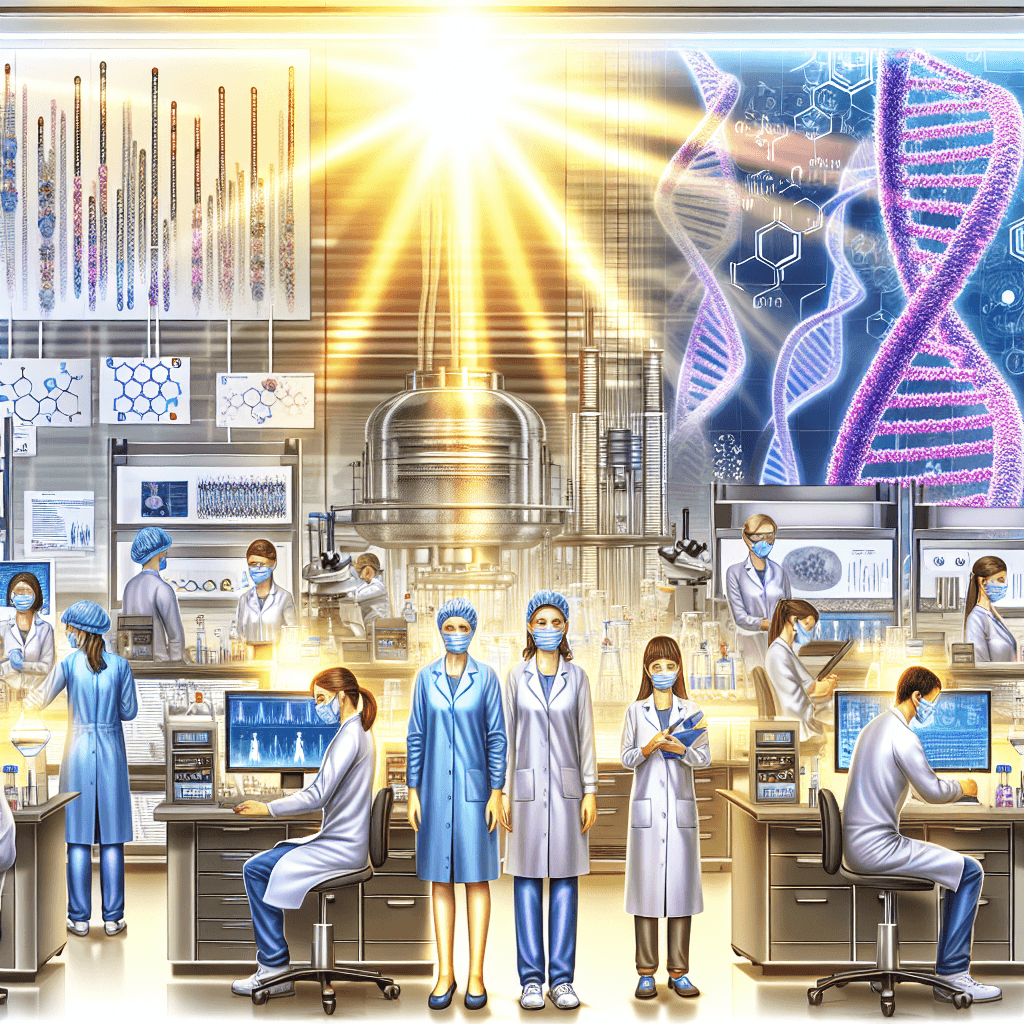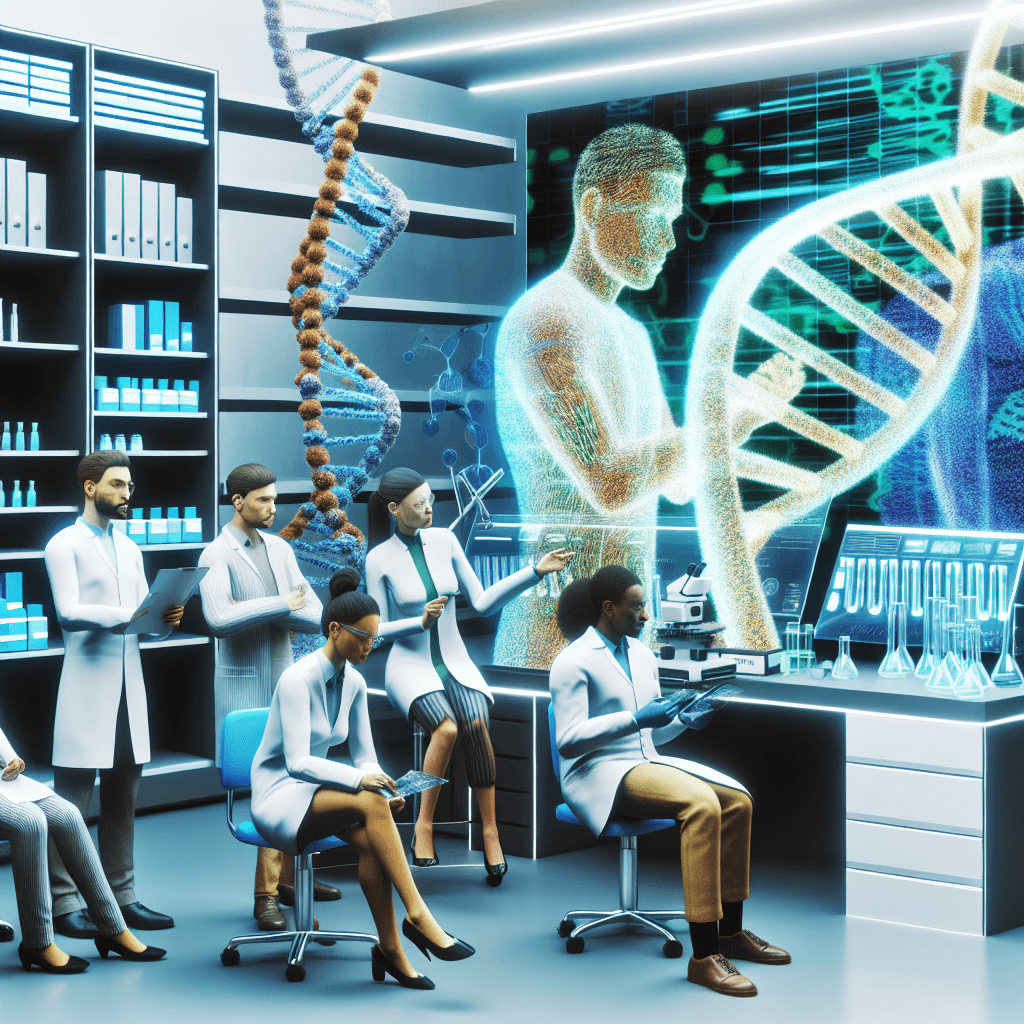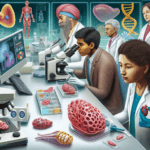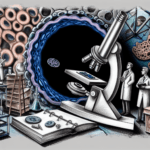Discover how biotech is revolutionizing precision medicine and improving patient outcomes. Learn about the latest advancements in this field.
Exploring Biotech’s Role in the Development of Precision Medicine

Table of Contents
- Introduction
- The Impact of Biotech on Precision Medicine: Advancements and Challenges
- From Gene Editing to Personalized Treatments: How Biotech is Revolutionizing Precision Medicine
- Collaboration between Biotech and Healthcare: Driving the Growth of Precision Medicine
- The Future of Precision Medicine: How Biotech Innovations Will Shape the Landscape
- Q&A
- Conclusion
“Unlocking the potential of precision medicine through biotechnology innovation.”
Introduction
Precision medicine is a rapidly growing field in the healthcare industry that aims to provide personalized and targeted treatments for patients based on their unique genetic makeup, lifestyle, and environment. This approach has the potential to revolutionize the way we prevent, diagnose, and treat diseases. Biotechnology plays a crucial role in the development of precision medicine, as it involves the use of advanced technologies and techniques to analyze and manipulate genetic information. In this essay, we will explore the important role of biotech in the development of precision medicine and its potential impact on the future of healthcare.
The Impact of Biotech on Precision Medicine: Advancements and Challenges
Precision medicine, also known as personalized medicine, is a rapidly growing field that aims to provide tailored medical treatments based on an individual’s genetic makeup, lifestyle, and environment. This approach to healthcare has the potential to revolutionize the way we prevent, diagnose, and treat diseases. And at the forefront of this revolution is biotechnology.
Biotechnology, the use of living organisms or their components to create products or processes, has played a crucial role in the development of precision medicine. From the discovery of new biomarkers to the production of targeted therapies, biotech has paved the way for the advancement of precision medicine. Let’s take a closer look at how biotech has impacted precision medicine and the challenges that lie ahead.
One of the key contributions of biotech to precision medicine is the identification of biomarkers. Biomarkers are measurable indicators that can be used to diagnose diseases, predict treatment response, and monitor disease progression. Biotech tools, such as genomics, proteomics, and metabolomics, have enabled researchers to identify and analyze these biomarkers in a more efficient and accurate manner.
For instance, the Human Genome Project, a biotech initiative that mapped the entire human genome, has led to the discovery of numerous genetic biomarkers associated with various diseases. This has allowed for the development of genetic tests that can identify individuals at risk of developing certain diseases, such as cancer or Alzheimer’s, and guide personalized treatment plans.
In addition to biomarker discovery, biotech has also played a crucial role in the production of targeted therapies. These are treatments that specifically target the underlying cause of a disease, rather than just treating its symptoms. Biotech tools, such as gene editing and gene therapy, have made it possible to develop these targeted therapies.
For example, in the case of cancer, biotech has enabled the production of monoclonal antibodies, which are proteins that can specifically bind to cancer cells and trigger an immune response to destroy them. This targeted approach has shown promising results in treating various types of cancer, with fewer side effects compared to traditional chemotherapy.
However, despite the significant advancements made by biotech in precision medicine, there are still challenges that need to be addressed. One of the major challenges is the high cost of biotech treatments. The development of targeted therapies and genetic tests requires extensive research and development, which can be costly. This cost is then passed on to patients, making these treatments inaccessible to many.
Moreover, there is also a lack of diversity in the data used for biomarker discovery and drug development. Most of the data used in biotech research comes from individuals of European descent, leading to a lack of representation of other ethnicities. This can result in treatments that are not as effective for certain populations, highlighting the need for more diverse data and inclusion in biotech research.
Another challenge is the ethical considerations surrounding biotech and precision medicine. With the ability to manipulate genes and alter the course of diseases, there are concerns about the potential misuse of biotech tools. This has led to the need for strict regulations and guidelines to ensure the ethical use of biotech in precision medicine.
In conclusion, biotechnology has played a crucial role in the development of precision medicine, from biomarker discovery to the production of targeted therapies. However, there are still challenges that need to be addressed, such as high costs, lack of diversity in data, and ethical considerations. As biotech continues to advance, it is essential to address these challenges to ensure that precision medicine can reach its full potential and benefit all individuals.
From Gene Editing to Personalized Treatments: How Biotech is Revolutionizing Precision Medicine

Precision medicine, also known as personalized medicine, is a rapidly growing field that aims to tailor medical treatments to an individual’s unique genetic makeup. This approach has the potential to revolutionize the way we treat diseases, as it allows for more targeted and effective treatments. Biotechnology plays a crucial role in the development of precision medicine, from gene editing to the creation of personalized treatments.
One of the key components of precision medicine is the use of gene editing technology. Gene editing allows scientists to make precise changes to an individual’s DNA, which can have a significant impact on their health. This technology has been made possible by advances in biotechnology, specifically the development of tools such as CRISPR-Cas9. This revolutionary gene editing tool has made it easier and more efficient to make precise changes to DNA, opening up new possibilities for precision medicine.
One of the most promising applications of gene editing in precision medicine is in the treatment of genetic diseases. By targeting and correcting the specific genetic mutation responsible for a disease, gene editing can potentially cure or significantly improve the condition. This has already been demonstrated in clinical trials for diseases such as sickle cell anemia and beta-thalassemia. Biotechnology companies are also working on developing gene therapies for other genetic diseases, such as cystic fibrosis and Duchenne muscular dystrophy.
In addition to gene editing, biotechnology is also playing a crucial role in the development of personalized treatments for diseases. Personalized treatments involve tailoring medical treatments to an individual’s specific genetic profile, as well as other factors such as lifestyle and environment. This approach takes into account the fact that individuals may respond differently to the same treatment due to their unique genetic makeup.
One example of personalized treatment is the use of biomarkers to guide cancer treatment. Biomarkers are specific molecules or genetic changes that can indicate the presence of a disease or predict how a patient will respond to a particular treatment. Biotechnology companies are developing tests that can detect these biomarkers, allowing doctors to personalize cancer treatment based on the individual’s specific biomarker profile. This approach has been shown to improve patient outcomes and reduce side effects compared to traditional “one-size-fits-all” treatments.
Another area where biotechnology is making significant contributions to precision medicine is in the development of targeted therapies. These are treatments that specifically target the molecular pathways involved in a disease, rather than just treating the symptoms. Biotechnology companies are using advanced techniques such as high-throughput screening and computer modeling to identify potential drug targets and develop targeted therapies. This approach has already led to the development of successful treatments for diseases such as cystic fibrosis and certain types of cancer.
The use of biotechnology in precision medicine is not limited to the development of treatments. It also plays a crucial role in the diagnosis and monitoring of diseases. For example, biotechnology companies are developing advanced diagnostic tests that can detect diseases at an early stage, allowing for more effective treatment. These tests can also monitor disease progression and response to treatment, providing valuable information for doctors to adjust treatment plans accordingly.
In conclusion, biotechnology is at the forefront of the development of precision medicine. From gene editing to personalized treatments, biotech companies are driving innovation and revolutionizing the way we approach disease treatment. With continued advancements in biotechnology, we can expect to see even more personalized and effective treatments for a wide range of diseases in the future.
Collaboration between Biotech and Healthcare: Driving the Growth of Precision Medicine
Precision medicine, also known as personalized medicine, is a rapidly growing field in healthcare that aims to tailor medical treatments to an individual’s unique genetic makeup, lifestyle, and environment. This approach has the potential to revolutionize the way we prevent, diagnose, and treat diseases. And at the forefront of this revolution is the collaboration between biotech and healthcare industries.
Biotechnology, which involves the use of living organisms or their products to develop or modify products and processes, has played a crucial role in the development of precision medicine. With advancements in biotechnology, scientists are now able to analyze an individual’s genetic information and identify specific genetic variations that may contribute to the development of diseases. This information can then be used to develop targeted treatments that are more effective and have fewer side effects.
One of the key areas where biotech and healthcare industries are collaborating is in the development of biomarkers. Biomarkers are measurable indicators that can be used to diagnose diseases, monitor disease progression, and predict treatment response. Biotech companies are using their expertise in genomics, proteomics, and other technologies to identify and validate biomarkers that can be used in precision medicine. These biomarkers are then used by healthcare providers to make more accurate diagnoses and develop personalized treatment plans for their patients.
Another area where biotech and healthcare industries are working together is in the development of companion diagnostics. These are tests that are used to identify patients who are most likely to benefit from a particular treatment. By analyzing a patient’s genetic information, companion diagnostics can determine whether a patient will respond to a specific drug or not. This not only helps healthcare providers make more informed treatment decisions but also reduces the risk of adverse reactions and unnecessary treatments.
The collaboration between biotech and healthcare industries has also led to the development of gene therapies. Gene therapy involves the insertion of genetic material into a patient’s cells to treat or prevent a disease. Biotech companies are using their expertise in gene editing and delivery technologies to develop gene therapies that can target specific genetic mutations and correct them. This has the potential to cure diseases that were previously considered incurable, such as certain types of cancer and genetic disorders.
In addition to developing new treatments, biotech and healthcare industries are also working together to improve the efficiency and effectiveness of clinical trials. With the help of biotech companies, healthcare providers can identify patients who are most likely to benefit from a particular treatment and recruit them for clinical trials. This not only speeds up the drug development process but also reduces the cost of clinical trials.
Furthermore, the collaboration between biotech and healthcare industries has also led to the development of digital health technologies. These technologies, such as wearable devices and mobile apps, can collect and analyze data on an individual’s health and lifestyle. This data can then be used to develop personalized treatment plans and monitor treatment response. Biotech companies are using their expertise in data analytics and artificial intelligence to develop these technologies, while healthcare providers are using them to improve patient outcomes.
The collaboration between biotech and healthcare industries has not only driven the growth of precision medicine but also created a symbiotic relationship between the two. Biotech companies are able to develop innovative treatments and technologies with the support of healthcare providers, while healthcare providers are able to offer more personalized and effective treatments with the help of biotech companies. This collaboration has the potential to transform the way we approach healthcare and improve patient outcomes.
In conclusion, the collaboration between biotech and healthcare industries is crucial in the development and growth of precision medicine. By combining their expertise and resources, these industries are able to develop innovative treatments, technologies, and strategies that can improve patient outcomes and revolutionize the healthcare industry. As we continue to make advancements in biotechnology, we can expect to see even more groundbreaking developments in precision medicine in the future.
The Future of Precision Medicine: How Biotech Innovations Will Shape the Landscape
Precision medicine, also known as personalized medicine, is an emerging approach to healthcare that takes into account an individual’s genetic makeup, lifestyle, and environment to tailor treatments and prevent diseases. This approach has the potential to revolutionize the healthcare industry, and biotechnology is playing a crucial role in its development.
Biotechnology, the use of living organisms or their components to create products or processes, has been at the forefront of medical advancements for decades. From the development of insulin for diabetes to the creation of vaccines for various diseases, biotech has been instrumental in improving human health. And now, with the rise of precision medicine, biotech is once again taking center stage.
One of the key areas where biotech is making a significant impact in precision medicine is in the field of genomics. Genomics is the study of an individual’s genetic makeup, and it is a crucial component of precision medicine. With the help of biotech tools and techniques, scientists are now able to sequence an individual’s entire genome at a fraction of the cost and time it used to take just a few years ago.
This advancement in genomics has opened up a whole new world of possibilities for precision medicine. By analyzing an individual’s genetic data, doctors can now identify genetic mutations that may increase the risk of developing certain diseases. This information can then be used to develop personalized treatment plans that target the specific genetic cause of the disease, rather than just treating the symptoms.
But genomics is just one aspect of precision medicine where biotech is making a significant impact. Another area where biotech is playing a crucial role is in the development of biomarkers. Biomarkers are measurable indicators of a biological process or condition, and they are essential in identifying diseases at an early stage and monitoring the effectiveness of treatments.
Biotech companies are using advanced technologies to identify and validate biomarkers that can be used in precision medicine. For example, by analyzing a patient’s blood sample, biotech companies can identify specific proteins or genetic markers that are associated with a particular disease. This information can then be used to develop diagnostic tests that can detect the disease at an early stage, even before symptoms appear.
In addition to genomics and biomarkers, biotech is also playing a crucial role in the development of targeted therapies. Targeted therapies are treatments that specifically target the underlying cause of a disease, rather than just treating the symptoms. These therapies are made possible by biotech innovations such as gene editing and gene therapy.
Gene editing, a technique that allows scientists to make precise changes to an individual’s DNA, has the potential to correct genetic mutations that cause diseases. This technology has already been used to successfully treat rare genetic disorders, and it is now being explored for the treatment of more common diseases such as cancer.
Similarly, gene therapy, which involves introducing healthy genes into a patient’s cells to replace faulty ones, is also being used to develop targeted therapies for various diseases. Biotech companies are constantly working on improving the safety and effectiveness of gene therapy, and it is expected to play a significant role in precision medicine in the future.
In conclusion, biotech is playing a crucial role in the development of precision medicine. From genomics to biomarkers to targeted therapies, biotech innovations are shaping the landscape of precision medicine and bringing us closer to a future where healthcare is truly personalized. With continued advancements in biotechnology, we can expect to see even more breakthroughs in precision medicine, leading to better health outcomes for individuals around the world.
Q&A
1. What is precision medicine?
Precision medicine is an approach to healthcare that takes into account individual variability in genes, environment, and lifestyle for each person. It involves using advanced technologies and data analysis to better understand a person’s unique health profile and develop personalized treatments and prevention strategies.
2. How does biotechnology play a role in precision medicine?
Biotechnology plays a crucial role in precision medicine by providing the tools and techniques needed to analyze and understand the vast amounts of data involved in this approach. Biotech companies are also developing innovative therapies and diagnostic tests that can target specific genetic variations and biomarkers, making precision medicine a reality.
3. What are some examples of biotech advancements in precision medicine?
Some examples of biotech advancements in precision medicine include gene editing technologies like CRISPR, which can target and modify specific genes associated with diseases. Biotech companies are also developing personalized cancer treatments based on a patient’s genetic profile, as well as diagnostic tests that can identify genetic predispositions to certain diseases.
4. How is precision medicine impacting the healthcare industry?
Precision medicine is revolutionizing the healthcare industry by shifting the focus from a one-size-fits-all approach to a more personalized and targeted approach. This has the potential to improve patient outcomes, reduce healthcare costs, and accelerate the development of new treatments and cures. It also requires collaboration between biotech companies, healthcare providers, and researchers, leading to a more integrated and data-driven healthcare system.
Conclusion
In conclusion, biotechnology plays a crucial role in the development of precision medicine. Through the use of advanced technologies and techniques, biotech companies are able to analyze and understand the complex genetic makeup of individuals, leading to more personalized and effective treatments. This has the potential to revolutionize the healthcare industry and improve patient outcomes. Additionally, biotech’s involvement in precision medicine has also opened up new avenues for research and discovery, paving the way for further advancements in the field. As we continue to explore and harness the power of biotechnology, we can expect to see even more breakthroughs in precision medicine and ultimately, a healthier and more personalized approach to healthcare.








